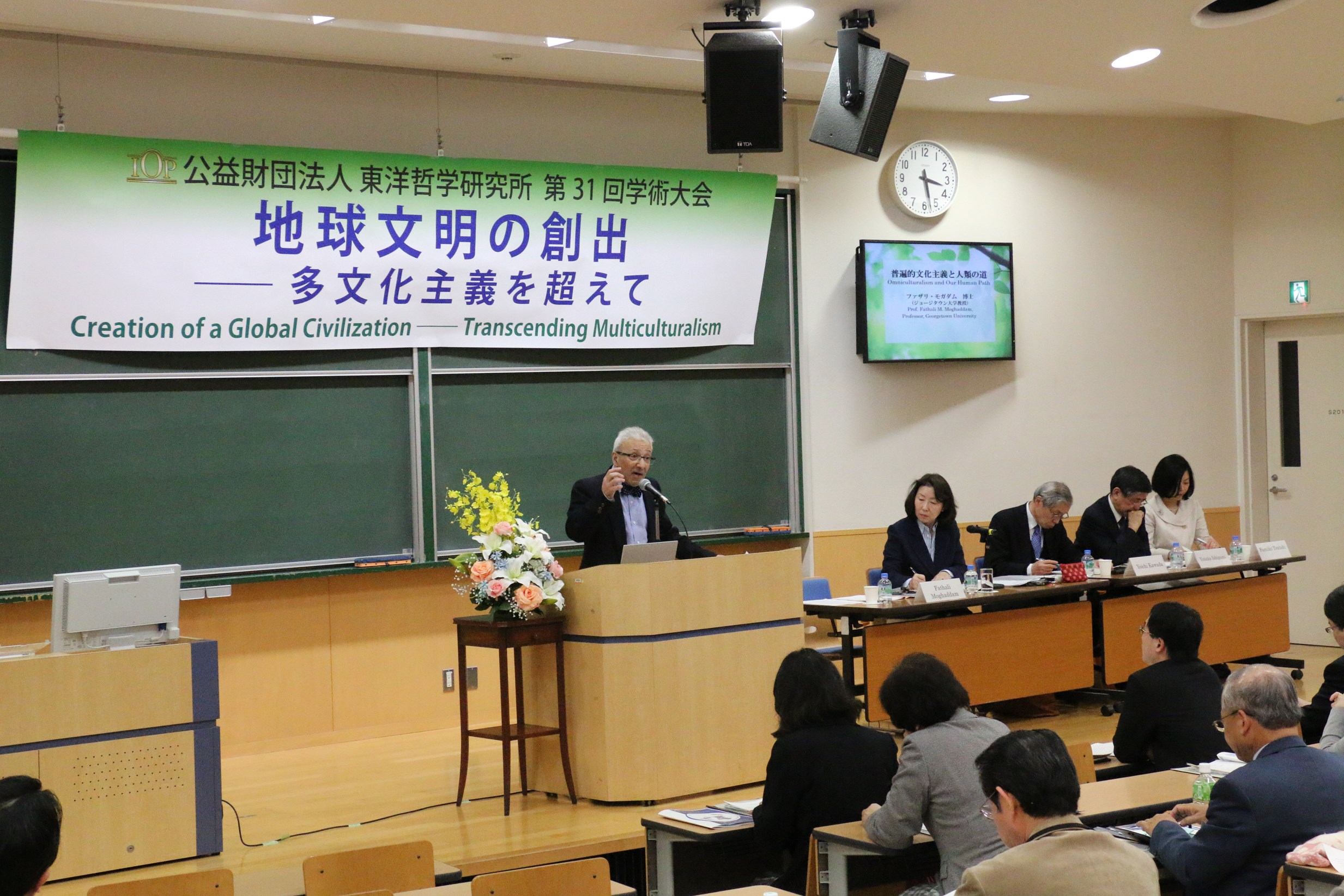




 |
 |
 |
 |
 |
 |
|
The
Institute of Oriental Philosophy
|
The 31st Annual Conference |
 |
 On
March 19 and 20, the Institute of Oriental Philosophy (IOP) held its
31st annual conference at Soka University and the IOP respectively.
Since its inauguration, IOP annual conferences have been held with the
aim of contributing to a global civilization through the study of
various topics including the Lotus Sutra, interreligious and
intercivilizational dialogue, peace, human rights and the environment. On
March 19 and 20, the Institute of Oriental Philosophy (IOP) held its
31st annual conference at Soka University and the IOP respectively.
Since its inauguration, IOP annual conferences have been held with the
aim of contributing to a global civilization through the study of
various topics including the Lotus Sutra, interreligious and
intercivilizational dialogue, peace, human rights and the environment.IOP invited Professor Fathali M. Moghaddam as a distinguished guest to the symposium, “Creation of a Global Civilization—Transcending Multiculturalism” held on March 19. Professor Moghaddam is a professor of psychology and director of the Conflict Resolution Program at Georgetown University’s Department of Government. In his lecture entitled, “Omniculturalism and Our Human Path,” Prof. Moghaddam introduced the idea of omniculturalism as a constructive and practical policy for managing diversity. He stressed that omniculturalism gives priority to human commonality, and is only concerned with inter-group differences as a secondary matter. He pointed out that the current issues facing humanity are problems related to globalization. He said that globalization is gradually eroding local languages and cultures, making it increasingly difficult for individuals to retain their local identities. “Globalization is driven by unpredictable technological and economic forces. Nobody can predict how technology will develop and how it will change us. These changes are driven not by governments but by unpredictable small groups.” He went on to explain how the new forces of globalization include sudden contact between groups that can lead to enormous psychological threats. “What is new about intergroup contact is the speed at which millions of people now move across continents. As we can see from the refugees coming from the Middle East, the speed of movement is very rapid. People in Southern Europe in particular are finding that millions of outsiders are arriving within very short periods of time. Similarly from South America to North America, tens of millions of people are moving very rapidly,” he said. Professor Moghaddam then touched upon the problem of terrorism, caused by globalization, representing a new security problem. “Faced with these movements and terrorism, democratic governments are introducing new laws that restrict freedom. In this sense, as globalization forces increased contact, both democracies and dictatorships feel threatened.” He emphasized the need to rethink politics in order to manage differences at the national and international levels, because traditional policies have been based on assimilation and, more recently, multiculturalism which lead many groups to feel threatened. He said that at the national level minorities feel very threatened, and at the international level many non-western countries and cultures feel threatened. “At the international level as well, I believe multiculturalism is highlighting differences too much, and creating problems. That is why I’ve suggested an alternative, that is, omniculturalism. ‘Omni’ means ‘all,’ and omniculturalism highlights human universals. In order to achieve a world where we focus on human commonalities, we have to have change.” Lastly, Professor Moghaddam mentioned that the abilities to be self-critical, and accept and learn from others, are all valuable qualities of global citizenship. He emphasized the importance of looking for that which we have in common rather than focusing on the things that separate us. At the symposium, Professor Yutaka Ishigami, Senior Research Fellow, and Ms. Fumiko Tsutaki, Commissioned Research Fellow of IOP, delivered their speeches, entitled, "Culture and Idea―The Dignity of life” as a postulate” and “Issue of Immigration and Refugees and Multiculturalism in Europe.” In conjunction with the symposium, IOP held research meetings on March 19 and 20. The programs of the meeting were as follows: March 19 ・“Tsunesaburo Makiguchi’s Naturalistic Theory of Value in his Later Writings on Religion” by Dr. Ryo Chonabayashi, IOP Research Fellow ・“The Origin of Evil in Christian Theology” by Dr. Tatsuya Yamazaki, IOP Research Fellow ・“For the Coexistence of Civilizations: War and Peace in Islam” by Dr. Hideki Iwaki, IOP Commissioned Research Fellow ・“How Education can Build a New Global Humanism: Does the Mediterranean civilization have the seeds to transcend multiculturalism?” by Prof. Francesca Maria Corrao, IOP Overseas Research Fellow March 20 ・“A. J. Toynbee and R. G. Collingwood: A Comparison” by Assoc. Prof. Junichi Kasuga, IOP Commissioned Research Fellow ・“Beiping City Social Affairs Department and Charitable Works—A Study of Xiangshan Orphanage and Longquan Temple Orphanage—” by Ms. Heiwa Oe, IOP Commissioned Research Fellow ・“On Kyogen Illustrations of the Early Edo Period” by Dr. Michiko Fujioka, IOP Commissioned Research Fellow ・“The Image of Kushan Royalty: On the knots in woolen embroidery from burial sites in Mongolia” by Mr. Kenzo Kawasaki, IOP Commissioned Research Fellow |